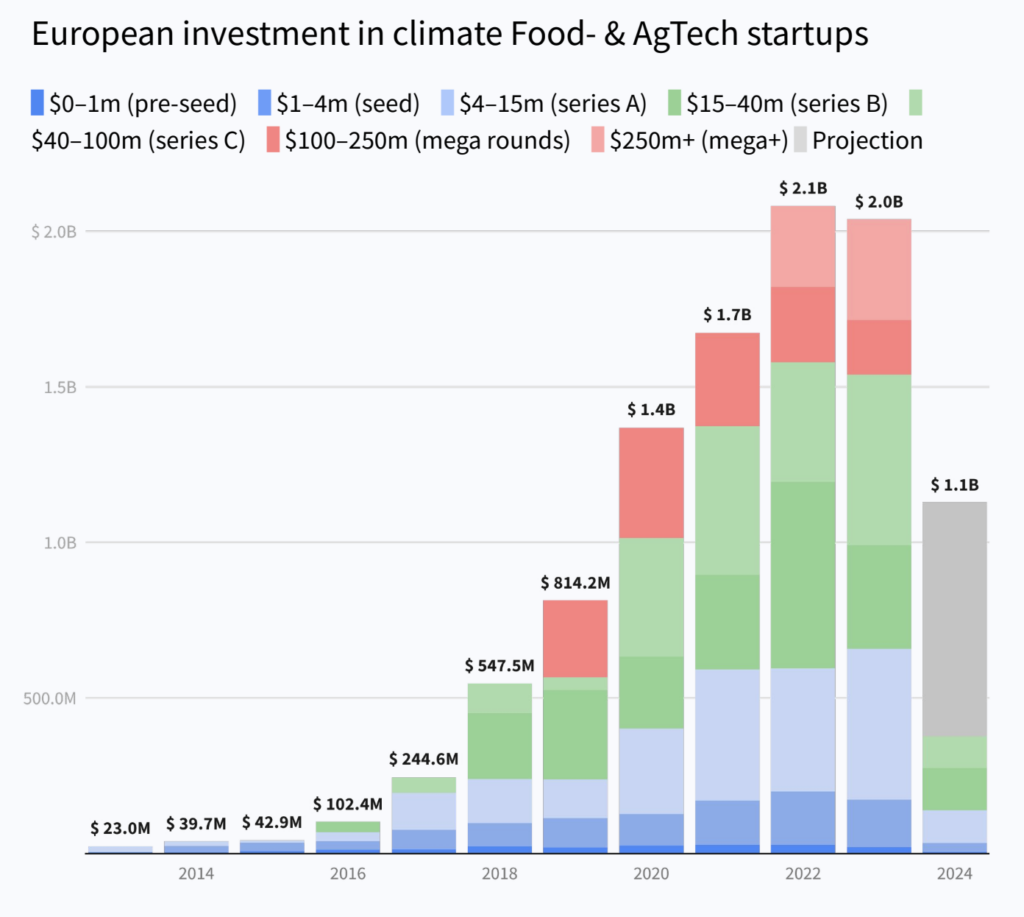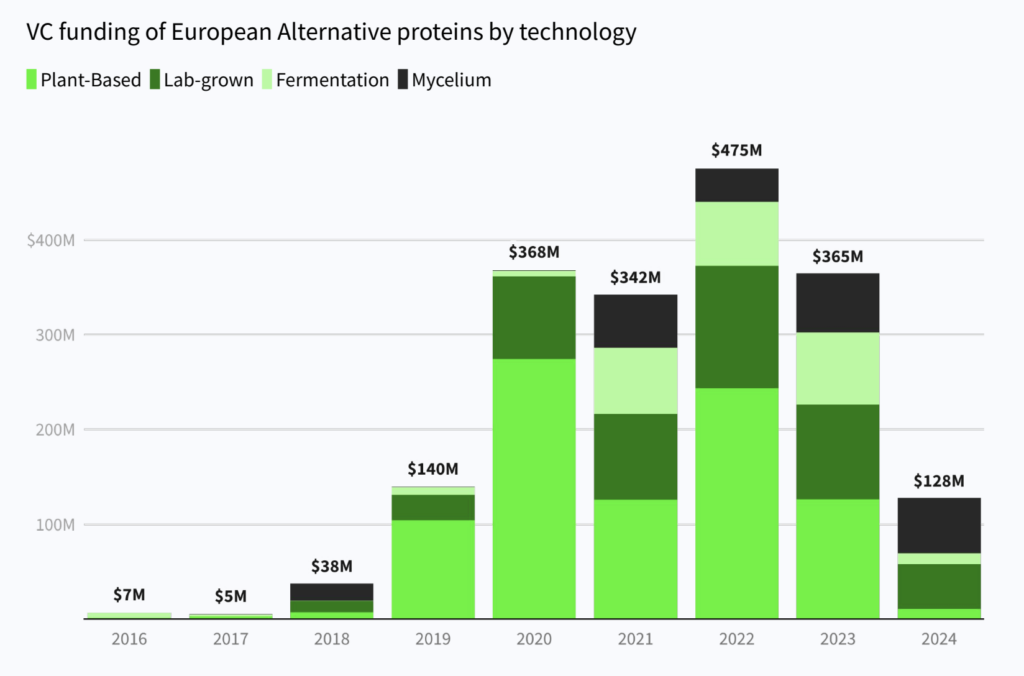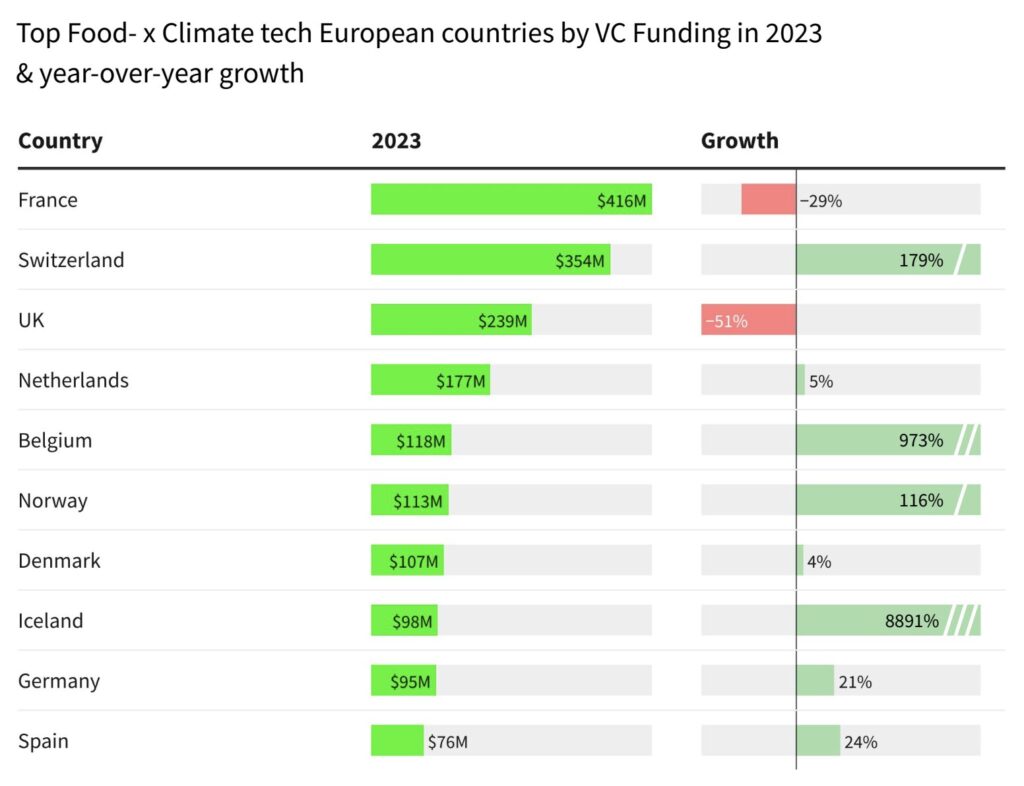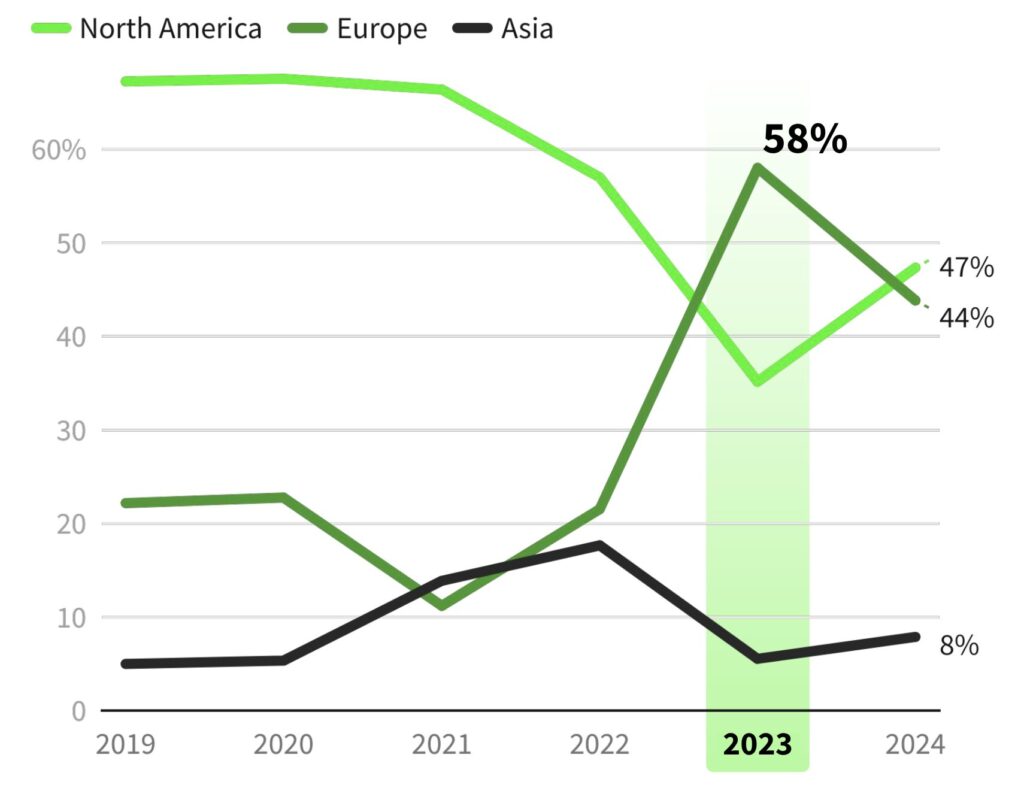European Food Tech Startups Overtook the US to Attract $2B in Investments in 2023
6 Mins Read
Climate-focused food tech companies in Europe raised $2B last year, making up 58% of global investment in the sector and surpassing the US for the first time.
European food tech startups focused on climate change solutions attracted $2B in investments last year, overtaking the US for the first time. Despite a global downturn in VC funding, funding in this sector matched the levels of 2022, when European companies raised $2.1B.
This is according to the annual Food for Climate report by early-stage VC firm FoodLabs and investment database Dealroom, which assessed over 1,200 climate-centric food startups across 40 segments to explore the state of the sustainable food & agtech ecosystem in Europe. The analysis suggests that European food tech companies made up 58% of global funding in the industry, much higher than the US (around 36%).

The agtech sector made up $1B of this sum, thanks in large part to increased interest in sustainable fertilisers – Atlas Agro alone raised $325M for its renewable fertilisers. Regenerative agriculture startups secured $581M overall, focusing on climate-resilient crops and microbial solutions.
“To address some of Europe’s most pressing challenges, we urgently need to finance and support innovative food solutions that help us adapt to a changing climate and mitigate its effects, while securing our food supply,” said Christophe F Maire, founding partner at FoodLabs.
Fermentation startups and alt-cocoa on the up in Europe
In 2023, European alternative protein startups raised $365M, led by plant-based companies. However, the real stars of the analysis were fermentation startups, which experienced a 12-fold increase since 2020 to reach $76M in investments last year.
And this year, fermented protein players have raised at least $12M, becoming the third most-funded segment in Europe’s alternative protein sector, ahead of plant-based startups. Specifically, mycelium protein has really taken off in 2024.

Maire expects fermentation startups to continue to remain dominant for the next two to three years. “Driven by the growing maturity of the space, many startups are turning to grownups and raising growth rounds for commercialisation at Series B stage and beyond,” he told Green Queen. “We also see products that are inherently superior to plant-based approaches in terms of taste and texture, and are close to price parity.”
Meanwhile, meat analogues are by far the most attractive protein segment for investors, making up over 70% of investments in Europe last year. Their supremacy is expected to continue this year, with a projected share of 56%. Alternative dairy startups, however, have witnessed a sharp decline, going from 60% of the sector’s capital injections in 2020 to a forecast of less than 1% for 2024.
These figures have been impacted by the rise in egg substitutes (projected to make up nearly 30% of alternative protein funding this year) and alternative fats and oils (13%). Startups tackling the cocoa and coffee industries also gained a lot of ground, in response to surging prices and climate concerns.

Alternative cocoa players received $69M in 2023 (doubling the capital from the year before). “The space has been overlooked, but is gaining prominence for three key reasons,” Maire said. These include the environmental impact (dark chocolate is the second most polluting food group, mainly due to land use); ethical considerations (given the incidence of child labour in the value chain); and price fluctuations (cocoa prices reached an all-time high this year).
“We believe that the emerging bioeconomy and scientific breakthroughs have the potential to solve some of the biggest food and climate issues,” said Patrick Noller, general partner at FoodLabs. “Many companies are pioneering efficient, cost-effective, and eco-friendly proteins and alternative ingredients through precision fermentation, biomass fermentation, molecular farming, and cell culture.”
France leads investments, but removing regulatory barriers is key
Apart from alternative proteins, European food waste startups attracted $138M in funding last year, a 20% increase on 2022. Meanwhile, sustainable packaging companies received $70M (a 46% year-on-year hike), and biomaterial producers raised $41M (a 238% increase).
Overall, the climate-focused food tech sector was the second-best performing category across European industries in 2023, representing just a 2% decline in investments, behind only the energy industry (which saw a 16% hike). On average, the continent witnessed a 37% drop in VC financing.

The UK leads the way as a climate-food tech hub, home to 18% of the sector’s startups in Europe. This is followed by the Netherlands (14%), and France and Germany (12% each). However, French companies received the most capital ($416M), and that’s after a 29% dip from 2022. Switzerland ($354M) and the UK ($239M) were next on the list, with impressive gains made by the former, as well as countries like Belgium, Norway and Iceland.
In terms of who is putting the money in, the EU-backed European Innovation Council Fund has been the most active pre-seed investor since 2016, making 33 investments in the climate-centric food tech space. This is closely followed by the Blue Horizon Corporation (30) and state-owned bank Bpifrance (26). Likewise, Belgium’s Astanor Ventures (18) and France’s Demeter Partners (17) are the top investors when it comes to Series A+ rounds.
But in spite of the positives of 2023, projections for 2024 suggest a return to pre-pandemic levels ($1.1B), with the US expected to overtake Europe again. This is primarily due to the absence of mega-rounds like Atlas Agro’s. “The global venture [capital] industry is still in transition after the outlier years of 2020-21, a shift in monetary policy and higher interest rates,” said Maire. “We don’t expect global investment to increase in 2024, but we do expect a return to baseline.”

Startups will also have to contend with a reshuffled EU parliament, with the far-right’s rise raising fears about the bloc’s climate ambitions. “The EU already does a tremendous job of funding innovation through many direct and indirect programmes,” explained Maire. “However, it could simplify and standardise some of the regulatory hurdles – for example, for alternative protein companies.”
The EU’s current novel foods framework has left it lagging behind other governments – the US, Singapore and Israel have already approved cultivated meat for sale, while the UK is on the verge of doing so after announcing it’s breaking away from pre-Brexit regulations. In contrast, Italy has banned the production and sale of cultivated meat, and France and Romania are considering doing so too.



